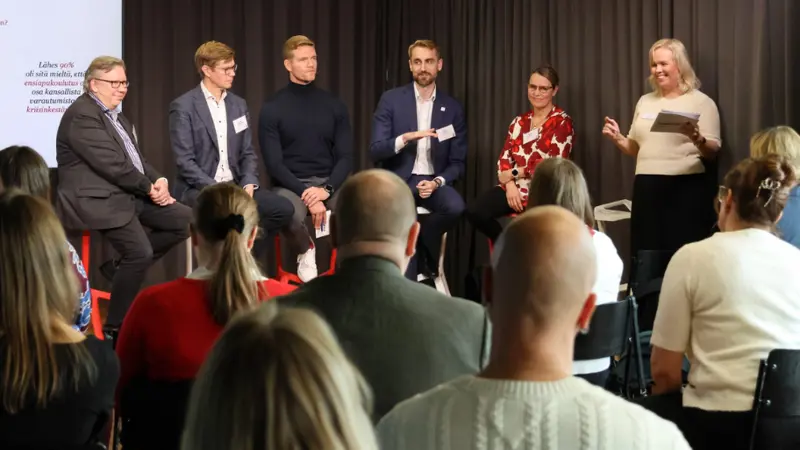The same friendship phenomena are repeated in workplaces as in schools for children
We want to feel accepted and seen as ourselves, whether we are children or adults. With a best friend, this can feel stronger than in a large group, but in the workplace, heart-to-heart friendships can also pose challenges.

There are different levels of friendship, but friendship of the heart has certain common characteristics.
– What distinguishes a heart-to-heart friendship from other friendships is the degree of closeness and trust. With a heart friend, there is a feeling of being a whole person with all your vulnerabilities and sharing your joys and sorrows together," says Outi Ikonen, Senior Organisational Psychologist at Terveystalo.
Heart friends often experience a strong emotional connection. One is my person, so to speak.
– Friendship can therefore involve jealousy: what if a friend rejects you or finds someone else's best friend? Nor is it always equal or reciprocal: for example, one person may be more active in making contact and the other may feel left behind. If you notice this, it's good to consider whether the friendship is nominal or genuine," Ikonen adds.
Is children's heart-friendliness different from adults?
According to Ikonen, friendship is a very similar emotional experience, whether you are a child or an adult.
– It is important for people of all ages to feel accepted and seen as themselves. This can be felt more strongly with a close friend than in a large group.
However, children's social and friendship skills are still developing.
– Clashes and resentments can occur more easily than in adult friendships, although adults are not immune to injury. However, children show their feelings more directly than adults in every way.
Why are we also looking for the best people to work with?
We also tend to seek the company of like-minded people because they are safe to be around.
– As with any friendship, a best friend at work is a source of security. You can discuss difficult workplace issues in confidence.
According to Ikonen, in working life, pairs of friends also have a functional purpose.
– If you work better with one person than another, you feel that you get a lot done with a good colleague. No energy is wasted on reconciling different ways of working and communicating.
The best colleagues can exclude others
As natural and joyful as it is to form friendships, the best friends often exclude others.
– Friends may not even notice this. Other colleagues may feel that friends work mainly alone and others are left on the outside. It can be particularly damaging in the workplace if a front person is good friends with a team member, and this is seen by others as favouritism," says Ikonen.
It's not worth emphasising your heart-to-heart in the workplace
According to Ikonen, a good guideline is to not let your romantic relationships affect your work and not to emphasise them in the workplace.
– All colleagues should be treated and treated as equally good working friends. While it is natural to get on better with others, as an adult you have a responsibility not to let this influence your own behaviour.
It is also good practice for a team to work flexibly with different colleagues on issues that require teamwork.
– "You often find that when you work with someone with whom you don't immediately find a common ground, you learn a lot more about yourself and the way you work than you would with a familiar and safe colleague," Ikonen says.
Read more articles

Terveystalo's digital services have been awarded the internationally recognized ISO27001 information security certification.
Terveystalo's information security practices, processes, and risk management are in line with international best practices.

Does massage help relieve stress? – Touch restores and calms the body and mind
Stress is not always visible on the outside, but the body does show signs when the strain increases. According to Lassi Ylönen, a trained massage therapist at Terveystalo Rela, the body often communicates stress through subtle signs.

Circular economy and artificial intelligence boost performance and improve care
At the heart of sustainable healthcare, technology serves as a tool for improving both the quality of care and accountability. Terveystalo favors solutions that combine sustainability, cost-effectiveness, and medical expertise.

Psychologist: How to make Christmas a relaxed and personal celebration
For many, the anticipation of Christmas begins when cities are decked out in seasonal lights and the first chocolates, calendars, and gingerbread cookies appear on store shelves. Christmas carols ring out and the Tonttuparaati choir sings “Kiire jo on! Kiire jo on!” (Hurry up! Hurry up!). This warm and atmospheric celebration also brings other feelings to mind: how on earth can we get through all this without losing our joy and peace in the rush?

Terveystalo and Gosta Labs deepen their cooperation: the goal is to streamline work with a superior patient information system
Terveystalo is deepening its cooperation with Finnish health technology company Gosta Labs and investing €1 million in the company as a minority investor. The aim is to jointly develop artificial intelligence solutions that improve the quality of care and the efficiency of reception work as part of Terveystalo's new patient information system, Terveystalo Ella.

First aid preparedness in companies requires action and courage
First aid skills increase resilience, but a barometer survey of Finnish organizations' first aid capabilities published in October reveals that the number of trained personnel is alarmingly low.